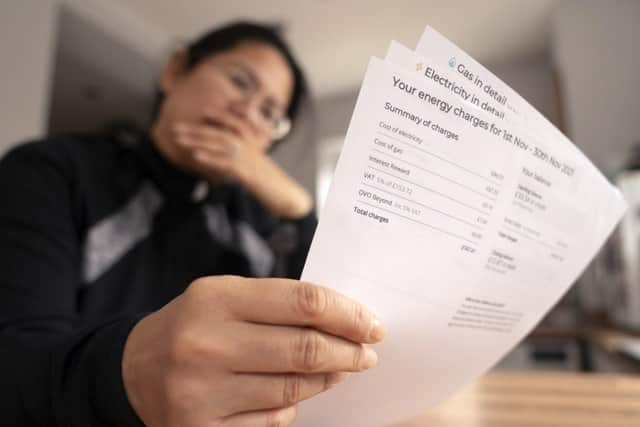Average Doncaster household could spend more than £3,500 per year on energy from October
and live on Freeview channel 276
Ofgem, the UK's energy regulator, announced last week that it will increase the energy price cap from October 1.
It means the maximum price a supplier can charge for electricity will rise on average from 28p per kilowatt-hour (kWh) to 52p per kWh, while gas will increase from 7p to 15p per kWh.
Advertisement
Hide AdAdvertisement
Hide AdIncluding standing charges, it means the average household's energy costs on a variable tariff in the UK will increase by 80 per cent – from £1,971 to £3,549 per year.


Energy charity National Energy Action said millions now face a "big freeze" and urged the Government to act immediately to provide greater support ahead of the winter.
Department for Business, Energy and Industrial Strategy figures show the average household in Doncaster used a median amount of around 2,733.8 kWh of electricity and 12,550.41 kWh of gas in 2020.
A kWh is the amount of energy required to provide one kilowatt of power for one hour and the median – the middle number in a series – is used to ensure the figures are not skewed by extreme highs or lows.
Advertisement
Hide AdAdvertisement
Hide AdAt current prices, it means the average household on a variable tariff in the area would be paying around £1,910 per year to heat and fuel their home. But when the price cap increases in October, this will soar to approximately £3,570.
Households on a fixed tariff will pay for energy at their current rate until the term comes to an end.
Adam Scorer, NEA chief executive, said the scale of harm caused by soaring prices needs to sink in and that warm homes will be a "pipe dream" for many.
"Without bold action to support the most vulnerable and those on the lowest incomes, this will effectively prise their fingers from the cliff edge and push them over the precipice.
Advertisement
Hide AdAdvertisement
Hide AdHouseholds need mon ey in their pockets to weather this storm or we are going to see millions in dangerously cold homes, suffering in misery with unimaginable debt and ill health."
Energy consultancy firm Cornwall Insights expects the price cap to rise dramatically again in January and April .
It would mean annual domestic fuel costs will have more than tripled in one year.
Torsten Bell, chief executive of the Resolution Foundation, a think tank focused on improving living standards, said Britain is on course for a "winter catastrophe" that poses a serious threat to families' physical and financial health.
Mr Bell added: "Big bill reductions combined with solidarity taxes, or throwing the kitchen sink at a brand-new social tariff scheme, should be the focus for whoever becomes the next Prime Minister."
A Government spokesperson said direct financial aid, targeted at the most vulnerable, will "continue to reach people's pockets in the weeks and months ahead", and that preparations have been made so that this support can be implemented as quickly as possible when the new Prime Minister is in place.
Comment Guidelines
National World encourages reader discussion on our stories. User feedback, insights and back-and-forth exchanges add a rich layer of context to reporting. Please review our Community Guidelines before commenting.
